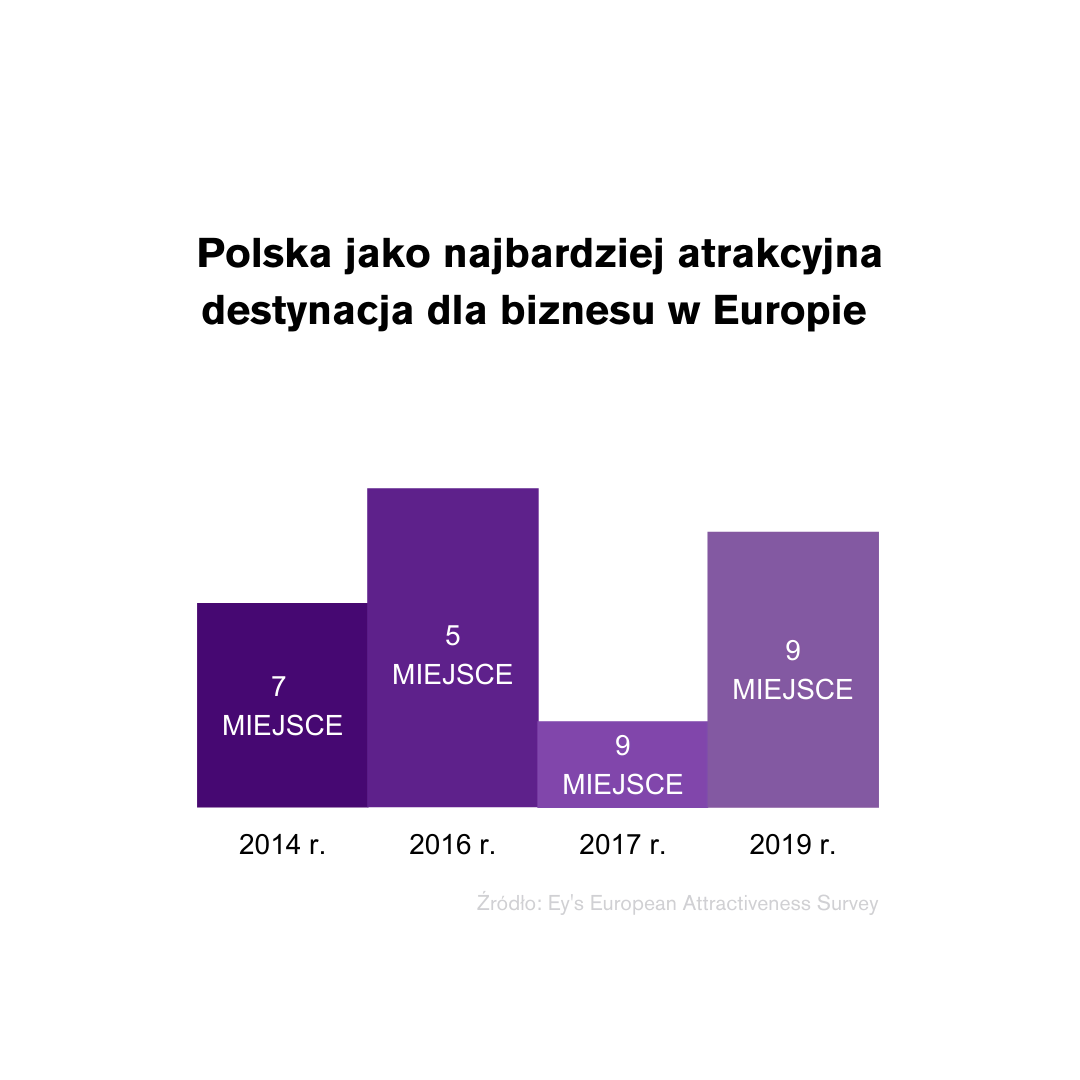The Polish cities – which are most popular with investors?

Table of contents
Warsaw, Wrocław, Poznań, Łódź, Trójmiasto, Kraków and Katowice for the first time – these are the cities analysed in the 3rd edition of the Antal survey entitled “Business Environment Assessment Study”, with Cushman & Wakefield and Vastint acting as the BEAS partners, and PAIH and Pro Progressio Foundation which took the patronage over it. The investment development of the Polish cities is shaped mainly by employment potential, infrastructure and availability of office space, as well as educational potential. How do the individual cities score in the ranking?
The reports are based on the subjective assessment of the top decision-makers (CEOs, board members and department directors) of companies present in Poland. The study analysed seven factors that influence the attractiveness of cities and encourage investment. These are: infrastructure, office space, public administration support, educational potential, employment potential, business potential and the assessment of the location as a place to live.
Poland rises through the ranks
In the face of the Covid-19 pandemic and the global economic crisis, decision-makers are increasingly pondering whether to invest in development and, if so, where? Poland is known for its relatively low labour costs, which makes it still an attractive location for foreign investments.
The increased interest in investment is also visible in the portfolio of projects implemented with the support of the Polish Investment and Trade Agency (PAIH). In 2020, the Agency handled nearly 200 investment projects, the total value of which was almost 10 percent higher compared to the previous year. The main reasons for locating investments in Poland are well-educated employees who are open to innovations. The strategic location of Poland on the map of Europe, favourable investment climate and economic stability work to our advantage – comments Monika Grzelak from the PAIH Investment Centre. We expect that in 2021, the positive investment trend will be maintained and that Poland will be one of the beneficiaries of the post-pandemic order –adds Monika Grzelak.
Poland is developing dynamically. The more so when it comes to transport infrastructure, both road, rail, air and sea – which increases significantly the interest of potential investors. One of the main assets of the Tri-City, which makes this metropolitan area stand out in comparison to other urban centres in Poland, is a direct access to Poland’s largest seaport. In other locations, transport infrastructure will be a strength, e.g. in Warsaw or in Łódź, which both owe a lot to their central location on Poland’s map – points out Radosław Kostka, Acquisition Manager at Vastint.
The power of change in infrastructure – Poland’s capital city in the lead
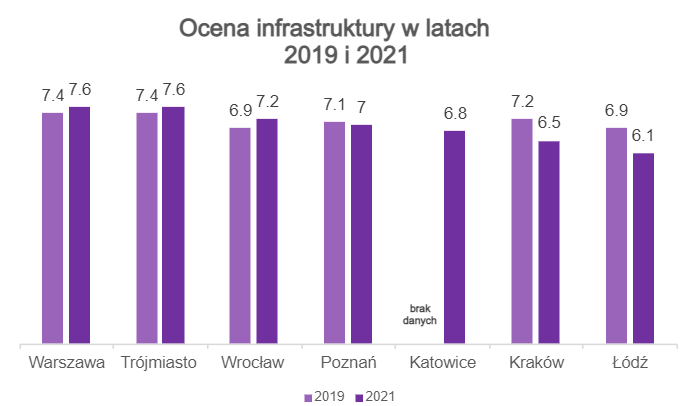
An important factor contributing to Warsaw’s reputation is the consistent urban policy dedicated to Warsaw’s entrepreneurs and residents. Poland’s capital is an open, friendly and dynamically developing metropolis. Thanks to its investment potential and its central location in Europe, for years it has been an undisputed regional leader in terms of economic development and the maturity of the office space market – comments Rafał Trzaskowski, Mayor of Warsaw. In 2020, the total of 314 thousand sq. m. of office space was added to Warsaw’s office market. If forecasts are to be believed and if the planned projects are to be implemented in 2021, Warsaw’s office market will soon reach the scale of 6 million sq. m. of office space – adds Trzaskowski.
Original office space and attractive prices – the strength of Polish real estate
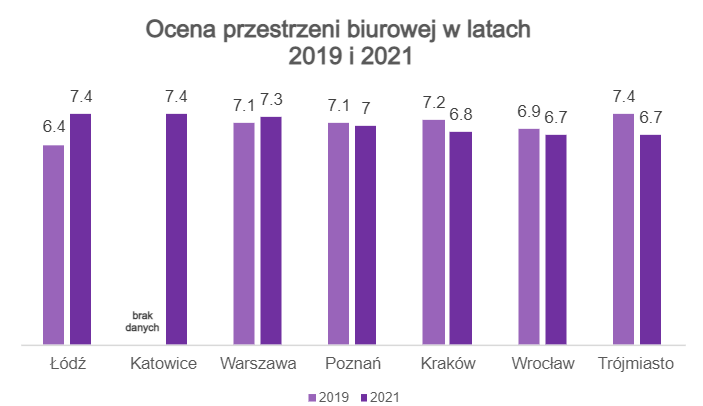
Over the past 15 years, the regional office markets in Poland have developed their offer for tenants. Competition between different regions of the country and at the level of individual cities has enriched the quality of investments and the diversity of the offer. These factors, combined with the natural geographic dispersion of regional markets, create an attractive response to the needs of investors affected by the COVID-19 pandemic. The significant development of office resources in Łódź and Katowice in recent years and the expected increase in resources in smaller urban centers increase the investment attractiveness. The office market in Poland is well prepared to compete for new global business processes. The geographical diversification of the Polish office market makes it easier to compete with other countries and fosters expansion inside the country - comments Michał Galimski, Partner, Director of Regional Markets in the Office Agency Department, Cushman & Wakefield.
The strength of human capital, or the availability of wide talent pool
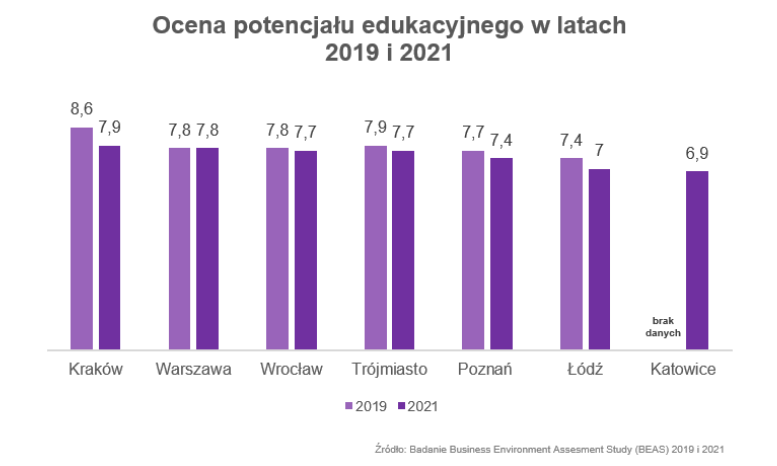
The investment potential of cities is strongly correlated with human capital, composed mainly of specialised employees, students and graduates thoroughly educated in specific fields. Large cities such as Krakow, Warsaw, and Wroclaw have long been attracting talented students from all over Poland and abroad, thanks to the offer of Wroclaw’s best universities and a wide range of available majors as well as great professional perspectives on the dynamically developing labour market. Unfortunately, the educational potential is decreasing, which is caused, among others, by population decline, which requires investing in innovative economy – comments Artur Skiba, Antal's CEO.
Well-trained staff as the key to urban development
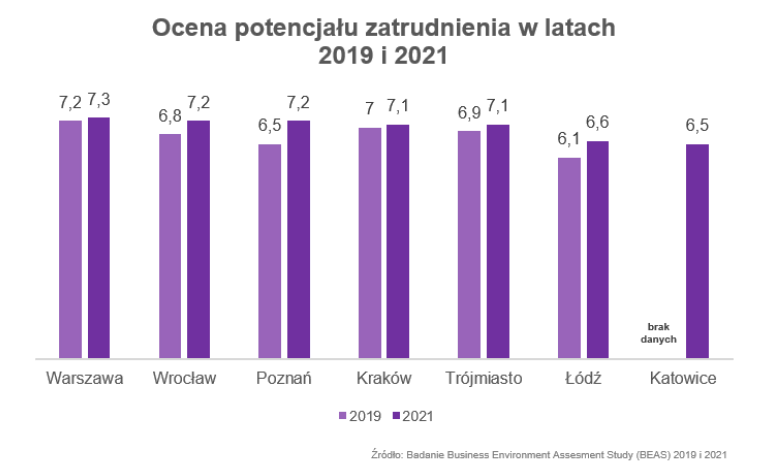
Wrocław, thanks to the quality of its universities, including the second best technical university in Poland, stands on the podium among top Polish cities in terms of access to talent pool with engineering, IT, linguistic (almost 100% of Wrocław students speak English), analytical and financial skills – says Wiktor Doktór, Chairman of the Board of the Pro Progressio Foundation. On the other hand, what acts as a catalyst for business development in Poznań is the high quality of life in the city. According to the Statistics Poland’s data, the average gross salary of a Poznań resident is also dynamically growing. Despite hard times and the Covid-19 pandemic, the city does not lose its investment attractiveness. Poznań has a wide offer of modern office space to rent at stable rental rates. These are surely important assets which can attract new investors as well as encourage the current ones to stay in the city – adds Doktór.
The Business Environment Assessment Study survey was conducted using the CAWI method among the heads of 809 companies in Poland in Q4 2020. The series of reports dedicated to major urban centres in Poland aims to describe the business reality in which companies operate. The material allows to look at the Polish market from the business perspective and indicate the main trends in the economic development of enterprises. The report, which is prepared annually, contains information on the level of remuneration of specialists and managers in the Polish market. The full report is available at:



